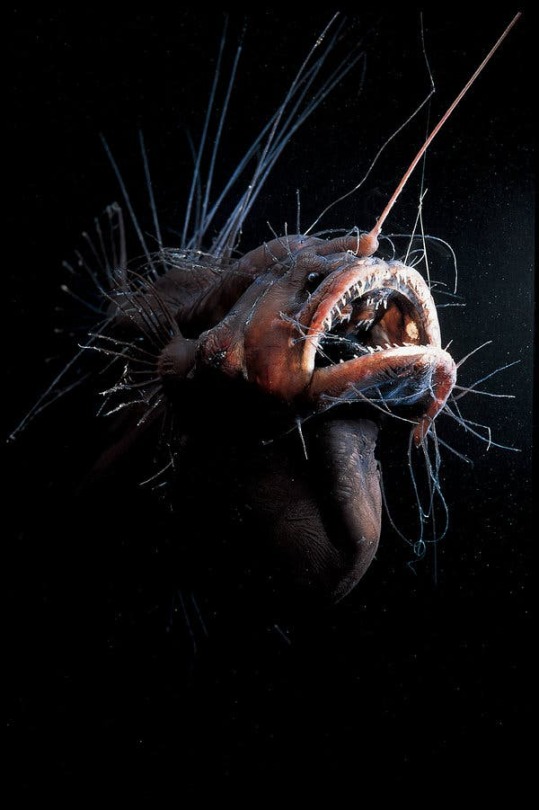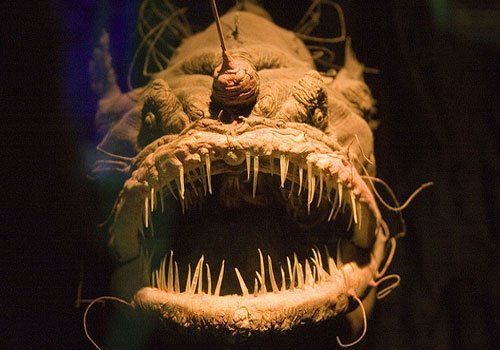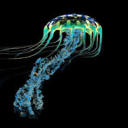Googly-eyed Glass Squid


Googly-eyed glass squid
Teuthowenia pellucida
The Googly eyed squid is a rare oddity that is found in the southern hemisphere. It has a large, spherical head that is filled with water and teeny, tiny tentacles that help propel it through the water. If it comes across a predator, it deflates its head and draws its tentacles into its cavity. On the other hand, it may also fill the cavity with water to increase its size, and intimidate the predator. If all fails, it will ink and try to escape through the darkness. Furthermore, baby squids can be found at the surface (0-600m); then slowly migrate downwards as they mature into adults (1600-2500m).
Photo credit: http://animaladay.blogspot.com/2011/07/googly-eyed-glass-squid.html
https://faunafabula.tumblr.com/post/5999675353/googly-eyed-glass-squid-teuthowenia-pellucida
More Posts from Bioluminescentoceangoddess and Others


Fanfin Seadevil
Caulophyyne jordani
The Fanfin Seadevil is an ugly, deep fish that is covered in gnarled skin and long sensory filaments. The sensory filaments allow this species of anglerfish to detect movement in the water; this helps the Fanfin find and lure its prey. Furthermore, this deformed monstrosity can be found floating between 700m to 3000m in the ocean.
Photo credit: https://www.nytimes.com/2019/07/29/science/anglerfish-bioluminescence-deep-sea.html
http://www.robotspacebrain.com/alien-creatures-of-the-mariana-trench/



Black Dragonfish
Idiacanthus atlanticus
The Black Dragonfish are needle-like fish that migrate between 500m and 2000m in the deep ocean. Females are black with 6 stripes and lack a barbel, pelvic fins, and sharp teeth. Males, on the other hand, are dark brown and have a barbel, which is the light producing structure on its chin. Furthermore, it uses bioluminescence to detect prey instead of lure prey.
Photo credit: https://scitechdaily.com/scientists-learn-secrets-from-ultra-black-skin-that-allows-deep-sea-fish-to-lurk-unseen/
https://steemit.com/life/@munnashah/the-most-terrible-and-surprising-7-animals-of-the-sea
https://knowyourmeme.com/photos/995601-thalassophobia


Pigbutt worm
Chaetopterus pugaporcinus
The Pigbutt worm or the flying buttocks of the sea is spotted floating between 965 m to 1300 m in the deep ocean. It is actually a polychaete (polly-keet) worm species that burrows in the ground as an adult, and floats around the ocean as a baby. The worm feeds itself : by creating a balloon of mucus; collecting particles on the mucus; and then consuming the particles. It is the rarest and thickest worm in the deep ocean, for only ten have been spotted.
Photocredit: https://roaring.earth/pigbutt-worm/

Hula Skirt Siphonophore
Physophora hydrostatica
The Hula Skirt Siphonophore a deep sea siphonophore that is found between 700 m to 1000m. It is made of a colony of hundreds tiny zooids. The top portion of the colony holds the swimming bells, which allow the colony to move. The bottom of the siphonophore holds the orange ‘hula skirt,’ which is full of stinging tentacles.
Photo link : https://twitter.com/montereyaq/status/1162068535331311617?lang=da


Wolftrap Angler
Thaumatichthys binghami
The Wolftrap Angler is slightly different from many other species of anglers. It has its bioluminescent lure located inside of its mouth instead of connected to its body. Even though it is intimidating up close, it is only nine centimeters in size. It is found in the deep ocean at 2432m.
Photo credit
https://en.wikipedia.org/wiki/Thaumatichthys_binghami
https://igniteyourcuriosity.wordpress.com/2016/10/22/anglerfish/


Gulper Eel
Saccopharynx sp.
The Gulper Eel is known for its massive jaws, which are capable of swallowing prey whole. It’s stomach is also able to expand twice its size. It is found only in the deep see about 2000 to 3000 meters in depth.
Photo credit: https://www.youtube.com/watch?v=XRO0IjSoHGA
https://marinebiochemistrygc2018.weebly.com/deep-sea-adaptations


Helmet Jelly
Periphylla periphylla
The Helmet Jelly can be found at all depths of the ocean. This vibrant and strange jellyfish tends to proliferate in Norwegian fjords. They are one of the dominant predators in these isolated ecosystems.
Photos
http://www.seawater.no/fauna/cnidaria/periphylla.html
https://www.bigfishexpeditions.com/2019/01/24/norway-deepwater-shark-diving-2018/helmet-jelly/
Dear ocean enthusiast and supporters,
Hi everyone, thank you for supporting my blog. I have gained over 500 followers and that is worth celebrating. I will try my best to post every day some of the amazing creatures that live in the deep ocean. Have a great night!


Pacific Viperfish
Chauliodus macouni
The Pacific Viperfish looks intimidating with its sharp, pointy teeth and large jaws. However, its body is small and elongated. It can be found at depths ranging from 250m to 4390m. The Pacific Viperfish long teeth are an unique adaptation designed to keep prey trapped, but it is dangerously close to its eyes. There have been instances when they have caught prey that are too large to swallow and it dies along with its last meal. The Pacific Viper also has photophores along its body and a light organ near its dorsal fin. These organs exhibit bioluminescence and help with attracting pray: as well as, communicating with mates and confuse predators. It is one of the most ferocious predators of the deep ocean.
Photo credit: https://www.science-rumors.com/top-20-pacific-viperfish-facts-to-know-what-this-creature-is/
https://goldfisho.com/everything-you-need-to-know-about-viperfish/

Crystal Jellyfish
Aequorea victoria
The Crystal Jellyfish is a graceful, transparent jellyfish with long, thin tentacles. It has bioluminescent organs around it bell that produce a bright, green light. It tends to consume small copepods, but it has the ability to swallow other jellyfish half its size. Furthermore, this jelly is used in biological experiments to detect calcium.
Photo credit: https://www.montereybayaquarium.org/animals/animals-a-to-z/crystal-jelly
https://fineartamerica.com/featured/5-aequorea-crystal-jellyfish-with-amphipods-alexander-semenovscience-photo-library.html
-
 ailinenelpaisdelasmaravillas reblogged this · 1 week ago
ailinenelpaisdelasmaravillas reblogged this · 1 week ago -
 wildernestt reblogged this · 2 years ago
wildernestt reblogged this · 2 years ago -
 albinopotoo liked this · 2 years ago
albinopotoo liked this · 2 years ago -
 nablah reblogged this · 2 years ago
nablah reblogged this · 2 years ago -
 fooling-ghosts liked this · 2 years ago
fooling-ghosts liked this · 2 years ago -
 snapbuttonsonadenimshirt liked this · 2 years ago
snapbuttonsonadenimshirt liked this · 2 years ago -
 vexedautomation liked this · 2 years ago
vexedautomation liked this · 2 years ago -
 torradh liked this · 2 years ago
torradh liked this · 2 years ago -
 tuopasserotto reblogged this · 2 years ago
tuopasserotto reblogged this · 2 years ago -
 hungry-hyena reblogged this · 2 years ago
hungry-hyena reblogged this · 2 years ago -
 hungry-hyena liked this · 2 years ago
hungry-hyena liked this · 2 years ago -
 nastywizard reblogged this · 2 years ago
nastywizard reblogged this · 2 years ago -
 nastywizard liked this · 2 years ago
nastywizard liked this · 2 years ago -
 joshurequiem liked this · 2 years ago
joshurequiem liked this · 2 years ago -
 communist-vaporeon413 liked this · 2 years ago
communist-vaporeon413 liked this · 2 years ago -
 faeriesmam reblogged this · 2 years ago
faeriesmam reblogged this · 2 years ago -
 suffereign reblogged this · 2 years ago
suffereign reblogged this · 2 years ago -
 vortexanomaly reblogged this · 2 years ago
vortexanomaly reblogged this · 2 years ago -
 vortexanomaly liked this · 2 years ago
vortexanomaly liked this · 2 years ago -
 low-level--00 reblogged this · 2 years ago
low-level--00 reblogged this · 2 years ago -
 low-level--00 liked this · 2 years ago
low-level--00 liked this · 2 years ago -
 u-0o0-u liked this · 2 years ago
u-0o0-u liked this · 2 years ago -
 hmmmmho liked this · 3 years ago
hmmmmho liked this · 3 years ago -
 qualquercoisainvisivel reblogged this · 3 years ago
qualquercoisainvisivel reblogged this · 3 years ago -
 beeftrapese liked this · 3 years ago
beeftrapese liked this · 3 years ago -
 astrotracksuitbattalion liked this · 3 years ago
astrotracksuitbattalion liked this · 3 years ago -
 despair-with-walnuts liked this · 3 years ago
despair-with-walnuts liked this · 3 years ago -
 808beat liked this · 3 years ago
808beat liked this · 3 years ago -
 in-soft-grass liked this · 3 years ago
in-soft-grass liked this · 3 years ago -
 in-w0nderland liked this · 3 years ago
in-w0nderland liked this · 3 years ago -
 windyboysworld liked this · 3 years ago
windyboysworld liked this · 3 years ago -
 balsamic--vinegar liked this · 3 years ago
balsamic--vinegar liked this · 3 years ago -
 miresgaleth reblogged this · 3 years ago
miresgaleth reblogged this · 3 years ago -
 miresgaleth liked this · 3 years ago
miresgaleth liked this · 3 years ago -
 l97ll liked this · 3 years ago
l97ll liked this · 3 years ago -
 levuna liked this · 3 years ago
levuna liked this · 3 years ago -
 transfuser liked this · 3 years ago
transfuser liked this · 3 years ago -
 hunnyhara liked this · 3 years ago
hunnyhara liked this · 3 years ago -
 mindwalkrhyme reblogged this · 3 years ago
mindwalkrhyme reblogged this · 3 years ago -
 passengerpigeons liked this · 3 years ago
passengerpigeons liked this · 3 years ago -
 bedsheetghost413 reblogged this · 3 years ago
bedsheetghost413 reblogged this · 3 years ago -
 bedsheetghost413 liked this · 3 years ago
bedsheetghost413 liked this · 3 years ago -
 rainbowfoam liked this · 3 years ago
rainbowfoam liked this · 3 years ago -
 oniongarlic reblogged this · 3 years ago
oniongarlic reblogged this · 3 years ago -
 d-e-s-i-d-e-r-a-t-a liked this · 3 years ago
d-e-s-i-d-e-r-a-t-a liked this · 3 years ago -
 melonisopod liked this · 3 years ago
melonisopod liked this · 3 years ago -
 deadlygoldfish22 liked this · 3 years ago
deadlygoldfish22 liked this · 3 years ago -
 kuze-hh reblogged this · 3 years ago
kuze-hh reblogged this · 3 years ago

Bioluminescence is a chemical reaction that produces light. Many deep sea animals use bioluminescence. This blog is dedicated to educating the public about the amazing creatures that thrive in the deep sea.
57 posts